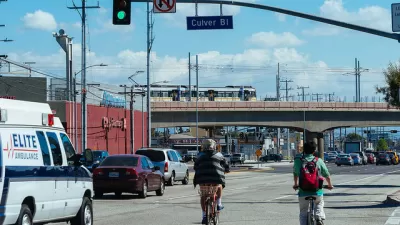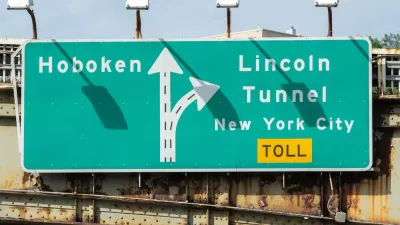Amanda Eaken offers up a defense of "Go Zones," otherwise known as congestion pricing. In Los Angeles and elsewhere, she argues, they could thin out traffic.

This Friday, we took a look at the Southern California Association of Governments' 100 Hours campaign, including its controversial congestion pricing proposal for Los Angeles. Here, the NRDC's Amanda Eaken argues that the plan makes a lot of sense, and that people might warm up to it once they see it in action.
Eaken writes, "Driving on most roads is 'free,' so we prioritize driving in the belief that we're spending zero dollars to get somewhere." But traffic entails high costs, to the driver as well as the city being driven in.
With congestion pricing, "drivers pay an automated fee to enter highly congested streets at peak hours; in return, they get the promise of smooth-flowing traffic and reliable travel times. Prices are set at the lowest possible level to free up just enough road space to eliminate bottlenecks."
Eaken cites Stockholm's congestion pricing program as an example of how drivers can warm up to an initially off-putting idea. "[M]ost drivers were confident they had favored congestion pricing all along, though a study before pricing was introduced showed 70 percent of the population was opposed."
FULL STORY: We CAN Solve America’s Traffic Nightmare

Maui's Vacation Rental Debate Turns Ugly
Verbal attacks, misinformation campaigns and fistfights plague a high-stakes debate to convert thousands of vacation rentals into long-term housing.

Planetizen Federal Action Tracker
A weekly monitor of how Trump’s orders and actions are impacting planners and planning in America.

In Urban Planning, AI Prompting Could be the New Design Thinking
Creativity has long been key to great urban design. What if we see AI as our new creative partner?

King County Supportive Housing Program Offers Hope for Unhoused Residents
The county is taking a ‘Housing First’ approach that prioritizes getting people into housing, then offering wraparound supportive services.

Researchers Use AI to Get Clearer Picture of US Housing
Analysts are using artificial intelligence to supercharge their research by allowing them to comb through data faster. Though these AI tools can be error prone, they save time and housing researchers are optimistic about the future.

Making Shared Micromobility More Inclusive
Cities and shared mobility system operators can do more to include people with disabilities in planning and operations, per a new report.
Urban Design for Planners 1: Software Tools
This six-course series explores essential urban design concepts using open source software and equips planners with the tools they need to participate fully in the urban design process.
Planning for Universal Design
Learn the tools for implementing Universal Design in planning regulations.
planning NEXT
Appalachian Highlands Housing Partners
Mpact (founded as Rail~Volution)
City of Camden Redevelopment Agency
City of Astoria
City of Portland
City of Laramie





























